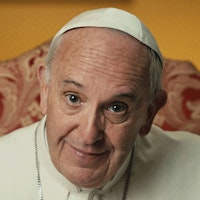For dialogue to take place there has to be this empathy. We are challenged to listen not only to the words which others speak, but to unspoken communication of their experiences, their hopes and aspirations, their struggles, and their deepest concerns.
For dialogue to take place there has to be this empathy. We are challenged to listen not only to the words which others speak, but to unspoken communication of their experiences, their hopes and aspirations, their struggles, and their deepest concerns.
Pope Francis

This Empathy
Topic: Interfaith Pathways
“For dialogue to take place, there has to be this empathy. We are challenged to listen not only to the words which others speak, but to the unspoken communication of their experiences, their hopes and aspirations, their struggles and their deepest concerns. Such empathy must be the fruit of our spiritual insight and personal experience, which lead us to see others as brothers and sisters, and to “hear”, in and beyond their words and actions, what their hearts wish to communicate. In this sense, dialogue demands of us a truly contemplative spirit of openness and receptivity to the other. I cannot engage in dialogue if I am closed to others. Openness? Even more: acceptance! Come to my house, enter my heart. My heart welcomes you. It wants to hear you. This capacity for empathy enables a true human dialogue in which words, ideas and questions arise from an experience of fraternity and shared humanity. If we want to get to the theological basis of this, we have to go to the Father: he created us all; all of us are children of one Father. This capacity for empathy leads to a genuine encounter – we have to progress toward this culture of encounter – in which heart speaks to heart. We are enriched by the wisdom of the other and become open to travelling together the path to greater understanding, friendship and solidarity. “But, brother Pope, this is what we are doing, but perhaps we are converting no one or very few people…” But you are doing it anyway: with your identity, you are hearing the other. What was the first commandment of God our Father to our father Abraham? “Walk in my presence and be blameless”. And so, with my identity and my empathy, my openness, I walk with the other. I don’t try to make him come over to me, I don’t proselytize. Pope Benedict told us clearly: “The Church does not grow by proselytizing, but by attracting”. In the meantime, let us walk in the Father’s presence, let us be blameless; let us practice this first commandment. That is where encounter, dialogue, will take place. With identity, with openness. It is a path to greater knowledge, friendship and solidarity.”
Pope Francis (born Jorge Mario Bergoglio; 17 December 1936 – 21 April 2025) was head of the Catholic Church and sovereign of the Vatican City State from 13 March 2013 until his death in 2025. He has the distinction of being the first pope to be a member of the Society of Jesus (Jesuits), and he is the first from the Americas and the Southern Hemisphere. Additionally, he is the first pope born or raised outside Europe since the 8th-century papacy of Syrian pope Gregory III.
Before becoming Pope, Francis led a significant career within the Church, known for his humility, emphasis on God's mercy, concern for the poor, and commitment to interfaith dialogue. His papacy has been marked by a shift towards more open and compassionate stances on social issues such as immigration, the environment, and the importance of inclusivity within the Church.
Pope Francis continues to be a transformative figure in the Catholic Church, encouraging dialogue, compassion, and a renewed focus on social justice. His groundbreaking leadership as the first Jesuit pope and his connections to various firsts in the history of the Papacy reflect a commitment to bridging gaps and fostering understanding across different cultures and traditions. His teachings and actions resonate with millions around the world, making him one of the most influential religious leaders of our time.
Pope Francis. “Meeting with the Asian Bishops at the Shrine of Haemi (17 August 2014) | Francis.” Biography | Francis, 17 Aug. 2014 [Pope Francis, 2014b:19].

Pope Francis
Copyright © 2017 – 2026 LuminaryQuotes.com About Us

Pope Francis
“Dialogue, in fact, is an essential part of the mission of the Church in Asia (cf. Ecclesia in Asia, 29). But in undertaking the path of dialogue with individuals and cultures, what should be our point of departure and our fundamental point of reference, which guides us to our destination? Surely it is our own identity, our identity as Christians. We cannot engage in real dialogue unless we are conscious of our own identity. We can’t dialogue, we can’t start dialoguing from nothing, from zero, from a foggy sense of who we are. Nor can there be authentic dialogue unless we are capable of opening our minds and hearts, in empathy and sincere receptivity, to those with whom we speak. In other words, an attentiveness in which the Holy Spirit is our guide. A clear sense of one’s own identity and a capacity for empathy are thus the point of departure for all dialogue. If we are to speak freely, openly and fruitfully with others, we must be clear about who we are, what God has done for us, and what it is that he asks of us. And if our communication is not to be a monologue, there has to be openness of heart and mind to accepting individuals and cultures. Fearlessly, for fear is the enemy of this kind of openness.”
— Pope Francis [Meeting with the Asian Bishops at the Shrine of Haemi].